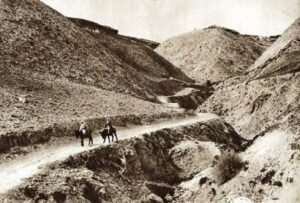
First Chronicles is placed in our Bibles in the Old Testament after the books of First and Second Kings but in the Jewish Bible it is at the end of the Old Testament and serves as a summary. It lets us know what was most important to God: The People Groups, The Palace, and the Place of God’s presence. If you are looking for detailed information on authorship, date, setting, etc., a good book to read is the Handbook on the Historical Books written by Victor Hamilton. It is helpful to understand the structure and themes.
David’s public and private sins both had consequences. Here we see the contrast in how they were handled. See chapters 20 and 21. While moral failings and their effects are tough to watch, we would do well to understand them. In seminary, one of my Pastoral Ministry classes was with Dr. Ken Swetland. We studied his book, The Hidden World of the Pastor. It was a case study on pastors who fell in various areas. It seemed very doom and gloom in the moment to a young student, and at the time it did not seem relevant, but over the years it has helped me navigate through some tough ministry appointments and counseling sessions with congregants. It also served as a warning for how people got into some of those traps in the first place. Forewarned is forearmed. Education doesn’t just teach us about God and theology but how to avoid mistakes others have made. Studying Biblical narratives is time well spent. My professor in Bible college, Dr. Don Meyers, used to tell us, “You never waste time sharpening your sickle.” If we understand these passages and apply them to real world situations, we will gain not only victory but spare ourselves much time and wasted pain.
I’ve thought a lot about the life of David this past month. I wonder how things would have been different if CNN or Fox News had covered his life. The public always seems to be blood thirsty to see printed stories of shame and fallen heroes. We forget that David, the predecessor of Jesus as King, the intimate worship leader and strong battle soldier, was still used and useful to God. In fact, much of his ministry happened after his greatest sins. That feels wrong somehow and cuts to the core of our sense of justice. One could argue grace is not cheap and David should have been benched, but Jesus literally died so grace could be effective. If his blood cannot cleanse the vilest sinner then his blood cannot make the likes of you and me clean. Oops, let’s slow the roll of punishment. We must be circumspect when judging others or we will train ourselves to not believe we too are in need of His grace. When we jump on the bandwagon of righteous posturing, “I just sensed something was off” and other such grandstanding in regard to other’s backsliding, we easily forget that without a Savior for our sins, we too would be in the proverbial pit of a sinner’s hell. The fallen one, David would one day make way for the King of Kings. Others may know your past but they do not know Gods decision about your future. Move Forward. Keep Moving. Move Forward.
David was contrite and repentant, and God saw his heart. When others pressed delete or pause, God was getting ready to hit play. He paused to repent (essential) but he kept moving forward. Without that cleansed heart things –would have stopped. God does not throw His investments away. We wonder, how did David go from intimate prayer warrior and worshipper to adultery and murder? Even the elect can be deceived, Matthew 24 tells us. Even the most trained, can fall into temptation. Maybe a better question, instead of being a voyeur into others lives would be, “Lord, how can I stay pure? ” How can I stay close to You?” or “Lord, Lead us not into temptation.” These very real kings and leaders are not much different than we are today. Reading this narrative can give us insight into what God values and what matters most to Him. A clean, contrite, repentant heart weighs more than a distant religious spirit. God was building David, even in the darkest days. God was building David even when he was not walking in Gods’ ways. God is not random* and God is infinitely postured to right a life or make a course correction for His kids. Only those who know grace, have received grace, truly believe that.
There are many “mantras” people have picked up for the New Year. Mine is,
“Jesus, may I know and desire You more in 2024.”
I’m asking for God to make me more thirsty, more hungry, this next year. Physically, I plan to drink more water and eat healthier. It’s a struggle to get that process working for hydration, vegetables, etc. The appetite has to be first stirred. Spiritually it is similar. We can’t fill an appetite we have not first fostered. If we are satiated with junk food, trivial matters, and other things, we may never desire what is choice, supreme. What if we started crying out for more thirst, more spiritual hunger, more capacity to be filled with the living, the holy God? What if we prayed for our homes, the block we live on, the church, the city?
This month I just want to share a couple highlights that stirred us, from our study of 1 Chronicles:
1 Chronicles 12:32 tells us, “And of the children of Issachar, which were men that had understanding of the times, to know what Israel ought to do”. Those who follow hard after God will hear the joyful noise, the alert, alarm, military call, and Psalm 89:15 tells us that those who know it will walk before the face of God. Those of you praying for the Middle East will appreciate this. Intercessors and those who keep their nose in the Bible and ear tuned to the Spirit remind me of this verse. Do we want to be in tune with God’s plans? Will we be able to hear the Lord’s voice and alert or are we saturated with the sounds of the city, the television, or our cell phones?
1 Chronicles 13
In this chapter David is seen to be very wise. He consults with the leaders, which suggests collaboration, listening to their ideas and sharing his. It was mutual and reciprocal. Consult here means to exchange wisdom, to deliberate and share counsel with one another and the text tells us that he did that with captains and leaders over large groups (thousands) and small groups (hundreds). He listened and he talked. He also gathered people together, he assembled them together. God deposits in each person different gifts and strengths and without hearing the collective group we cannot glean that information. The third wise thing David did was to inquire of the Lord. He wanted Gods’ heart and wisdom. He met with leaders, he gathered the regular people and he inquired of the Lord. That’s smart leadership.
David then shares a psalm (1 Chronicles 16) with the people. I’ve translated it so you can hear what it reads like in the Hebrew. It sounds Southern to my ears because of the plural you:
You all must cause yourselves to
Give thanks
Y’all must
cause yourselves to
Call upon His name
Y’all must
cause yourselves to
Make known His deeds among the people
Y’all must sing
Y’all must really sing loudly–sing the psalms!!!!!
Y’all must talk about all His wonderous works!
This great leader is admonishing them, encouraging, and exhorting them to stir themselves up to give thanks, call on God’s name and make God’s deeds known. There are some timid folks who get wiggy if someone praises. They are supposed pride busters and arrogance checkers. Ignore them. God’s word and here King David, is teaching us about warfare and living in God’s light. God is sovereign and all things come from Him, but we also have a part and it’s to PRAISE Him, to make known His deeds among the people. We cannot do that by sitting under the stairs silently. David tells us to sing and to sing LOUDLY, to tell of ALL of His wonderous works. This was part of his strength. Get your testimony of how you came to Christ written out. Prepare praise reports and share them with whoever will listen. Sing melodies in the elevator, in the mall and in the streets. Talk about All of Gods wondrous works and then loudly sing praises.
This summary book is filled with wisdom from God in the lives of His people and especially His chosen Shepherd boy and His chosen son, then King who would build the Temple. We can gain wisdom by reading it. I do not believe that these were mere religious words or things to do in church. His admonition to praise was part of his “secret to success” and battle plan. In battle- he kept praising, in tough places, he kept praising, in conflict- he kept praising. After deep, devastating, career blowing sin – he kept praising. Not because he was righteous but because he knew One who is. Not because he was worthy but he worshipped one worthy of all worship. Whether you have been successful last year or if you have major blown it, keep praising. God sees the long– term trajectory of your life and what HE needs for the Kingdom, season after season. Keep praising, keep following, keep believing.
If you have no pithy saying or mantra for 2024 – you can borrow mine. Jesus, we want to know and desire YOU more in 2024. More wisdom, more grace, more singing, praising, proclaiming and ALL that you have for us.
Seeking with you,
Rev. Dr. Renae Roche 2024
Jesus, we want to know and desire YOU more in 2024.
*Thanks to Ruth Hall for her devotion–“God is not random”. Thanks to Editor Virginia Bridges.







 When we lived in the woods, my husband and I would sit out in the backyard in the mornings and listen to hundreds of birds. It was quite the symphony. When we moved, I missed those familiar sounds. This morning, our cat meandered out onto our porch, leaving the door ajar. My ears were delighted to hear brand new sounds, unlike any I had heard before. I drew closer so I could hear each distinct sound. As they sang, the cat sat nearby making chattering noises. Before the sun rose, silence had been awakened with sounds unique to this area. I commented to the family that perhaps our cat meditated more than we had this week! It was a crazy, busy week.
When we lived in the woods, my husband and I would sit out in the backyard in the mornings and listen to hundreds of birds. It was quite the symphony. When we moved, I missed those familiar sounds. This morning, our cat meandered out onto our porch, leaving the door ajar. My ears were delighted to hear brand new sounds, unlike any I had heard before. I drew closer so I could hear each distinct sound. As they sang, the cat sat nearby making chattering noises. Before the sun rose, silence had been awakened with sounds unique to this area. I commented to the family that perhaps our cat meditated more than we had this week! It was a crazy, busy week.